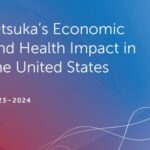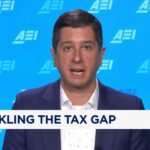NEWS
Unintended Consequences: Democrat’s Child Tax Credit Will Cost Jobs
President Biden’s first signature legislative accomplishment, the American Rescue Plan Act (ARPA), is now law. Nearly $1.2 trillion in fiscal aid will pour into the economy before October, and another $700 billion will be doled out over the next four years. As one of us has written previously, $1.9 trillion is a significant underestimate of the plan’s total cost if temporary expansions of several tax credits are permanently extended. The largest of these temporary policies is the expanded child tax credit (CTC), touted by Democrats as a boon to low- and middle-income households. In addition to being costlier than the sticker price, a permanent CTC expansion, a goal expressed by many Democratic lawmakers, would have the unintended consequence of reducing employment.
Alex Brill Talks Trade Disruption Due to Suez Canal Blockage on i24 News
Alex Brill joined i24 News’ Natasha Kirtchuk on “Global Eye” to discuss the cargo ship blocking the Suez Canal, and the trade impacts felt around the world.
Alex Brill Featured in Foundation for Economic Education Article
On fee.org, the website for the Foundation for Economic Education, author Brad Polumbo reported on Alex Brill’s estimates of the true cost of the American Rescue Plan.
U.S. Spending and Tax Policy After the COVID Recessions: Political Economy Podcast
Alex Brill recently joined James Pethokoukis on AEI’s Political Economy Podcast to discuss the potential economic impacts of spending initiatives in the wake of the COVID-19 pandemic.
Alex Brill Testifies Before U.S. Senate on Lowering Prescription Drug Prices
On Tuesday, American Enterprise Institute resident fellow and MGA founder and CEO Alex Brill testified before the Senate Health, Education, Labor & Pensions (HELP) Subcommittee on Primary Health and Retirement Security. The topic of the hearing was the skyrocketing prices of prescription drugs.
There are Costs for Climate Change Whether Leaders Take Action or Not
Much of the public debate over climate change policy focuses on the cost of reducing emissions, deploying green energy, or building adaptations. A point often lost is that whatever we do, we pay for climate change, even if we do nothing. For officials to arrive at effective solutions, they must know both the cost of the policy options and the cost of inaction.
How Will the American Rescue Plan Impact Your 2021 Tax Liability?
Last week, President Biden signed into law the $1.9 trillion American Rescue Plan (ARP). The plan provides economic relief to households through the tax code, making several credits fully refundable and advanceable and providing stimulus checks that already started arriving in bank accounts this past weekend. We have created a web application to help users explore how the American Rescue Plan will impact their 2021 federal tax liability.
Alex Brill Quoted in ‘The National Interest’ Article on Global Tax Hike
Alex Brill was recently quoted in Rachel Bucchino’s article on nationalinterest.org, “Joe Biden Is Leading the Charge on a Big Global Tax Hike.” The article examines Treasury Secretary Janet Yellen’s work on a global minimum tax for multinational corporations.
The American Rescue Plan’s Likely Cost is Way More Than $1.9 Trillion
The Senate is poised to consider President Biden’s American Rescue Plan, an elaborate bill recently passed by the House of Representatives through the budget reconciliation process at an estimated cost of $1.9 trillion over the coming decade.
Pick Your Child Tax Credit
The Child Tax Credit (CTC) is all the rage these days. Democrats and Republicans both are advancing proposals to increase the maximum value of the CTC and make it available to more families. We have developed a web application to accompany our recent report. Design Your Own Child Tax Credit Reform allows any user to compare popular current proposals or choose the parameters of their own preferred custom CTC reform.
The Tax Benefits of Parenthood: A History and Analysis of Current Proposals
Since 1917, tax filers with children have received ever-increasing federal income tax benefits. The tax benefits include deductions for each child or other dependent, lower tax brackets for head-of household filers compared to single filers with similar incomes, and tax credits for children and childcare expenses.
MGA Analysis of Potential Savings from Complex Generics Cited in Multiple Publications
This week, three publications in the healthcare policy and regulatory affairs industries referenced MGA’s recent report on the potential savings from accelerating US approval of complex generics.
MGA’s Alex Brill on The Hill: Virtually Live
MGA founder and CEO Alex Brill recently appeared on The Hill event Virtually Live to discuss how complex generic medical alternatives can impact and potentially enhance the American healthcare system. In this interview, Brill talks with The Hill moderator Steve Clemons about the MGA report outlining the potential savings from accelerating US approval of complex generics.
New MGA Report on the Potential Savings from Accelerating US Approval of Complex Generics
Matrix Global Advisors (MGA) today released a new report, “Potential Savings from Accelerating US Approval of Complex Generics,” by MGA founder and CEO Alex Brill.
The Costs of the Opioid Crisis: Forgotten America Podcast
Alex Brill recently joined Garrett Ballengee, founding executive director of the Cardinal Institute for West Virginia Policy, on their podcast “Forgotten America.” In this fascinating interview, Brill discusses the economic impacts of the opioid crisis in America, noting that the epidemic is no longer just an Appalachian problem.


























